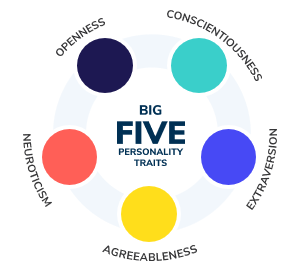The Stability Of Personality In An Unstable World
(Part 4 of a 4–part blog series helping brands think like real people)
Over the last month, on the back of a new research study, we have released a series of blog posts helping brands to better understand and think like real people. Using the lens of Agile Human Experience Intelligence™ (HXI), we have been exploring how people are reacting to the turbulent world around them and demonstrating how deeper understanding can help brands navigate these challenging times. The layering of these human factors over economic and societal trends is something we call ‘GutCheckonomics’.
So far, we have examined how people’s needs are changing, the importance of recognizing their evolving emotions (explicit and implicit), and why context is so key to behavior. This final post in the series explores the 4th dimension of Agile HXI – personality.
The rapidly evolving social and economic context on the heels of a multi-year pandemic could make one ask: Is anything about the human experience stable?

Yes. Despite uncertainty and volatility in today’s world, there are factors that impact the human experience that are relatively stable. One of these is personality traits, which are a factor that can influence reactions to messaging and purchase behavior. These traits are most often classified according to the “Big 5” or OCEAN model of personality – openness (O), conscientiousness (C), extraversion (E), agreeableness (A), and neuroticism (N).
What can personality traits tell us about if/how some people may respond to economic and societal changes? And what can these traits tell us about how people make usage, purchase, and investment decisions?
Personality Traits and Risk
First, they can help us understand to what degree a person is open to risk. People who are high on conscientiousness, on average, tend to also have a lower tolerance for risk. In contrast, people who are high on openness have, on average, a higher tolerance for risk and change. Of course, personality traits are not the only determinant of whether someone can afford – or is willing – to take risks, but knowing the dominant personality trait for your target market can serve as signal of whether you will see them among the first to do things like cut back on large purchases or limit their financial investing or borrowing.
Personality Traits and Spending
Second, personality traits can help us understand where certain people are more likely to maintain versus decrease spending. For example, people who are high on extraversion have been shown to entertain and eat out more frequently because they enjoy interacting with others. As prices rise, people high on extraversion may be less likely to cut back in these areas than people with a different dominant personality trait. Similarly, people high on agreeableness prefer to have pleasant, non-conflictual relationships, so may be less likely to give up travel to visit loved ones if doing so will create interpersonal conflict.
Personality Traits and Messaging
Research also shows that messages framed in ways that match a person’s dominant personality trait are evaluated more positively. Given that we know that people today are feeling a need for closeness (see name of prior blog post), brands may want to consider matching their message framing to the dominant personality trait of an audience to increase their appeal.
Implications For Brands
Because personality traits are relatively stable over a person’s lifetime, including the dominant personality trait of your target audience as one of your profiling factors can help you understand which types of reactions and behaviors might be general tendencies during these rapidly evolving times. Knowing these general tendencies may also help you determine how best to frame messages to convey empathy.
__________________
We hope you have enjoyed these blog posts and this journey to better understand key elements – context, personality, universal needs, and emotions – of the human experience.
If you’d like to learn more about our unique approaches to helping brands develop more empathy for the people they seek to serve, you can learn more about Agile Human Experience Intelligence here, and discover more GutCheckonomics resources here. Also, look out for details on our newest GutCheckonomics survey here, which demonstrates how fast people’s emotions, needs, and planned behaviors are changing today.
Our teams at GutCheck stand ready to help you address all your needs for Agile Human Experience Intelligence. Just reach out!
Study Details: GutCheck interviewed 1,008 adults on May 2-3, 2022, via an online survey. The sample was balanced on age by sex, region, and household income to census targets for the US 18-74 population.
Written By
Want to stay up to date latest GutCheck blog posts?
Follow us on
Check Out Our Most Recent Blog Posts
When Vocation and Avocation Collide
At GutCheck, we have four brand pillars upon which we build our business. One of those is to 'lead...
Reflections on Season 1 of Gutsiest Brands
Understanding people is at the heart of market research. Sure, companies want to know what ideas...
Permission to Evolve with Miguel Garcia Castillo
(highlights from Episode #22 of the Gutsiest Brands podcast) Check out the latest lessons from our...
1-877-990-8111
[email protected]
© 2023 GutCheck is a registered trademark of Brainyak, Inc. All rights reserved.
© 2020 GutCheck is a registered trademark of Brainyak, Inc. All rights reserved.




